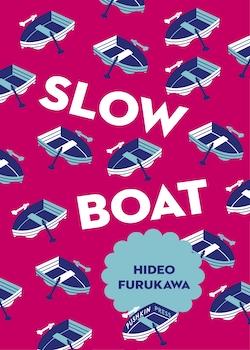Slow Boat

By Furukawa Hideo
Translated by David Boyd
Pushkin Press, 2017
ISBN-13: 978-1782273288
Review by Alice French
‘This is my botched Tokyo Exodus, the chronicle of my failures’ begins the anonymous narrator of Furukawa Hideo’s latest novella, Slow Boat. The story is a self-reflective, at times self-loathing, journey through the protagonist’s experiences of Tokyo, and the three girlfriends that characterise this journey. As is typical of Furukawa, the story straddles the real and the imagined, dipping in and out of the narrator’s memories, musings and dreams to create magical realism that would not be out of place in a Murakami novel.
Slow Boat takes a diary-like form, and is divided into nine different sections (boats) of our narrator’s ‘Tokyo Exodus’. We start with his school days, and the struggles he faces as a ‘dropout’ at an ‘alternative school’. Unable to find friends, he unexpectedly clicks with a talkative girl in the grade above him and she becomes his first girlfriend. Alas, the relationship is not to last, and the girl returns home after the summer; our protagonist loses touch with her as soon as she crosses the border of Tokyo into Yamanashi Prefecture. Our damned hero’s second sexually charged teenage romance is no more successful; he narrowly misses the opportunity to escape to Miyakojima with his girlfriend in an adrenaline-fuelled race against time that ends with a violent train brawl. Following this low point, things seem to be looking up. The narrator becomes the proud owner of The Power of Kate, a trendy Tokyo café tipped for great things, and soon falls in love with the young “knife girl” who works in the kitchen. This relationship is yet again not to be, however, and does not translate to a ticket out of Tokyo. The café is destroyed in a freak accident and the knife girl wins a place at an American university and he lets her go, resigning himself to a lifetime trapped in Tokyo. Thus, Furukawa’s protagonist has three chances to escape his hometown, and fails every time.
The saving grace of Slow Boat is Furukawa’s ability to make the relatively dislikeable narrator seem simultaneously accessible and eccentric, giving the reader insights into his most fleeting and profound thoughts. At regular intervals, we are returned to his recurring dream, featuring the CD On a Slow Boat to China, which is also the name of one of Murakami Haruki’s short stories, by which the book’s title was inspired. Although unable to find a way out of the city, our protagonist does find some respite from reality in his dreams. The text is also interspersed with short stories by the narrator’s friend, Nohara Kaku, seemingly filling the void formed when he cannot find any words himself.
Although the novella is at times melancholy and perhaps laboriously introspective, Furukawa prevents it from becoming overly dark by injecting some sporadic humour, for example with the narrator’s obsession with his first girlfriend’s ‘boobs’ and the unfortunate misnaming of his café, which was intended to be called The Power of Hate. The colloquial style of his prose also gives the story a lighter feel, making it easy to dip in and out of.
As in his recent Horses, Horses, in the End the Light Remains Pure, Furukawa is therefore able to make a reflective, potentially heavy-going story not only readable but very enjoyable. However, Slow Boat offers much more than a quick Saturday afternoon read. The protagonist’s desperate attempts to leave Tokyo, and eventual realisation that he will live and die there, as it houses ‘the roots of my soul’, leaves the reader wondering what exactly the city represents. Is it self-identity? Japanese society? Perhaps it is even a metaphor for Furukawa’s battle with writing itself; the narrator repeatedly complains about language, claiming that ‘the Japanese language is nothing but lies’. Whether you get on with the erratic and ill-fated protagonist or not, therefore, Slow Boat is bound to leave you engrossed in self-questioning. Kobayashi Hideo would be proud.

